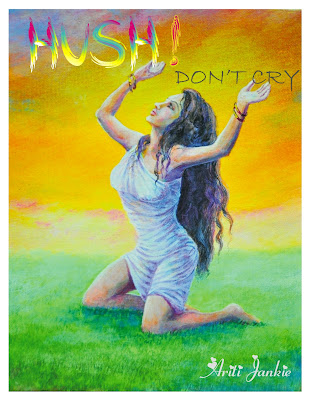 Ariti Jankie of the Express South Bureau just collected the first copies of her new novel HUSH! Don't Cry. For Ariti, it has been along hard road to publication, but perseverance and a fighting spirit won out in the end.
Ariti Jankie of the Express South Bureau just collected the first copies of her new novel HUSH! Don't Cry. For Ariti, it has been along hard road to publication, but perseverance and a fighting spirit won out in the end.Dear Zorina,
The novel, HUSH! Don’t Cry has brought me unexpected blessings.
Wednesday, I took the first 10 copies to the Express, South Bureau and sold all among my friends within an hour. They were so generous with warm embraces and hearty congratulations, I felt humbled.
Also, I called Deosaran Jagroo, the CEO of Caroni (1975) Limited to give him the good news of the release. He ordered five copies. Similarly, I have been receiving great vibes from this novel and have yet to notify my other big brothers and friends.
It is not often that good luck strikes and when it does, it banishes a lifetime of suffering and pain. I wanted to share this with you. And to include your generosity in reading, editing and getting the manuscript ready for publication.
HUSH! Don’t Cry has been a great experience so far and I wanted to share this with your blog readers.
Ariti
Book Review
HUSH! Don’t Cry is a compelling story of strength and power. The author, Ariti is incredibly at her best in this intricate but revealing novel deftly woven around themes of diaspora and gender.
The nostalgia and desire of the Indians in Trinidad for their original ‘homeland’ and the sense of double displacement that this nostalgia evokes within those who try and trace their ‘real’ roots is skillfully portrayed by Ariti.
The story revolves around Meera, who like the saint who endured all hardships, became an epitome of sacrifice and suffering before she let her inner strength and determination empower herself. Marrying her daughter to a “suitable boy” from “the golden land of India” (p.15) was a dream that Meera’s mother Sumintra, had sought to fulfill for her daughter. Meera lived her mother’s dream getting married to a boy (Kapil) from the land of her ancestors—a country which she knew “held secrets for her own discovery” (p.82). The groom and bride when married looked like ‘Ram and Sita’. Meerawanted to transmit her “pride of ancestry” of India to her daughter, but the trial and tribulations that Meera goes through eventually makes her realize the worth of her ‘own’ culture and sense of self which is a powerful mix of the East and West.
“Getting away from her loved ones” and moving to India liberated Meera and reduced the “pains and humiliations she faced” (p.81). However, she soon realized that Western women were considered by Indian men to have “no culture” and were referred to as jutha bartan (soiled dishes). This view was reinforced by Indian women who perpetrated atrocities against their own gender. And yet, there are anomalies even within them as they themselves rebelled against society and at the same time discriminated between themselves and ‘Western’ women.
Meera’s husband Kapil’s moral frailties eventually killed the love Meera felt for him. After a long struggle with herself and coming to terms with her unfulfilled thirst for her husband’s love, she realizes that she had been trying to live up to her mother’s false dream. She loses her innocence in that struggle to survive and emerges “a pioneer like her ancestors rooted in slavery and indentureship” (p.167). ‘Home’ for her was Trinidad—a space which drew life and solace from ancient Indian scriptures and traditions and yet gave her the power to take control of her own destiny.
HUSH! Don’t Cry thus completes a full circle with the protagonist pledging to work towards making her daughter Kavita’s dreams come true rather than living the dream of her mother, Sumintra. In that, Meera would find the strength to live her own dream.
Dr. Priti Singh
Jawaharlal Nehru University
September 12, 2010
Great going Arti, keep up the good work. I will look out for it.
ReplyDeleteKavita from Kelly Village
You go girl!
ReplyDeleteJennifer Kanhai
The review leads me to believe that we need to look at how we form relationships with people whose outlook of life is vastly different from ours.
ReplyDeleteDaniel Samaroo
Rousillac
Is this book going to be in the bookshops or what? Or will be read ABOUT it and don't see it like so many other books?
ReplyDeleteDenny Ramjohn
Come on let's give Arti a round of applause and put out money where our mouth is.
ReplyDeleteVindra from Clarke Road, and cousin Pinky from Rock Road
Sorry, I cannot comment on the political ramblings, but I want to use the opportunity to welcome a book that might open our eyes to the real workings of Hindustani families.
ReplyDeleteDharma Soekdhoe
known to the blogger from Surinam and visiting this lovely country